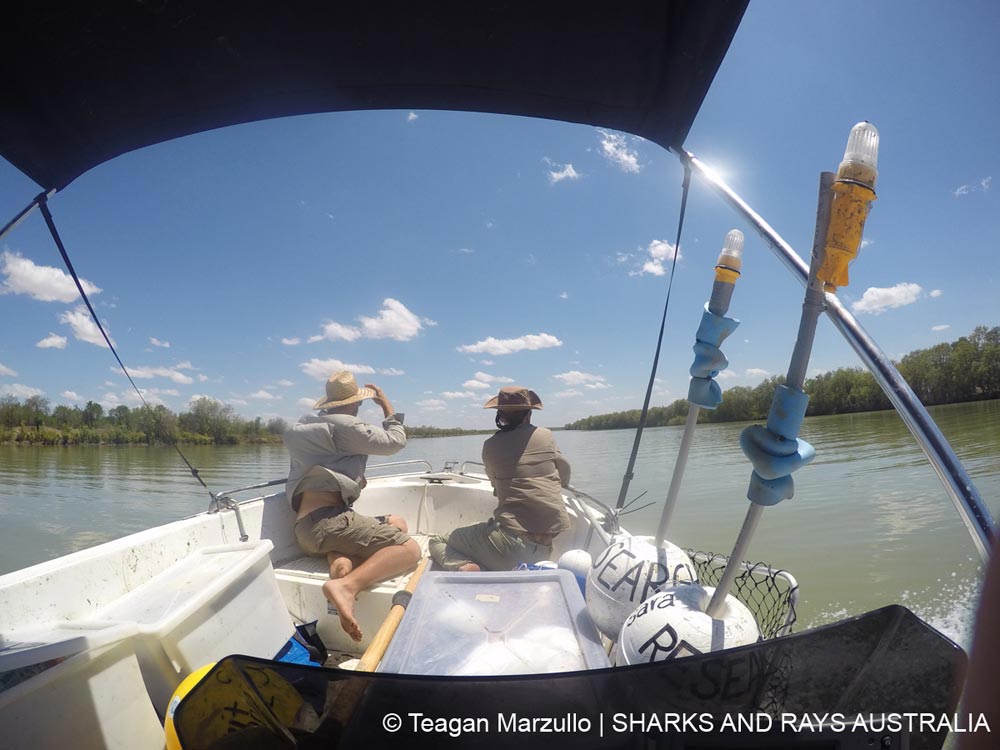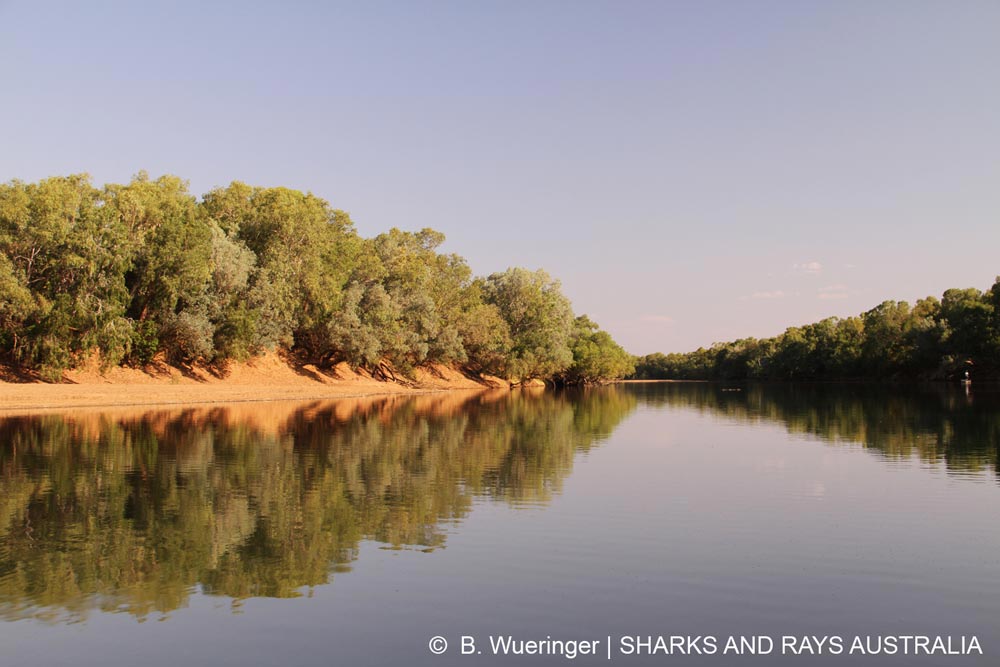Join us in 2024!
Protecting endangered species requires dedication. We conduct research with sharks, rays and sawfish in the remote regions of North Queensland, the Gulf of Carpentaria and Cape York. For this, we need dedicated field assistants.
Do you want to join our team and get hands-on experience in working with aquatic predators in remote locations? You will be part of a small team working with some of the most endangered species of sharks, rays and sawfish on the planet. You will learn how to conduct this research and fieldwork with these animals. You will also get out into remote areas that you would not likely be able to access by yourself. Be warned, we have a lot of fun on our expeditions. If you are a uni student, see if you can earn uni credits for your participation, as getting this ‘real life experience’ credited towards a course is often possible!
Dedication essentail, previous skills optional.
SARA runs around eight expeditions per year. All expeditions apart from the Mackay one leave from Cairns and last for 11 to 14 days. Our sampling methods used will include gill nets, hand lines, drum lines, and collection of eDNA. We use a variety of different tags to gain information on the ecology of our study species. For more information on our research goals see here. Our equipment and fieldwork protocols ensure that capture and handling stress for each animal is minimized. Any shark, ray and sawfish captured will be tagged and released.
Expedition dates for 2024 are presented below.


“I would just like to say another massive thank you for the trip to Burketown! It was by far one of the funniest trips I’ve done and one I’ll never forget. What you’ve got going on up there is absolutely brilliant and perfect for up and coming scientists who have a hunger for hands on experience.”
Field site information
Your payment includes all food & accomodation from the first to the last day of the expedition. More details are in the Booking Form which is available for download once the deposit has been paid.
East coast expedition – Whitsundays coast / Mackay region – In 2021 we commenced sampling east coast locations in central Queensland. Our sampling sites are guided by data from our sawfish sighting Citizen Science campaign. Some locations that we are targeting are truly spectacular. We will be camping in camp grounds the whole time. Hurray hot showers!! Aboriginal Land and Sea rangers from Yuwi corporation will join us whenever possible. We meet participants in Airlie Beach.
East coast expedition – the Daintree – Returning to the Daintree is very exciting, as this is the only location that we work in that is located in the Wet Tropics rainforest. We have encountered many crocodiles here and tagged and released many bull sharks. We have not yet caught a sawfish in the Daintree, but the continuous reports about sawfish even far upstream, together with the fact that the Daintree was declared a net-free zone in the 1990s mean that we won’t give up. December in the tropics is hot and so we will be staying in air-conditioned cabins. Expedition leaves from Cairns.
East coast expedition – Lakefield (Rinyirru) National Park – In 2020, we commenced our sampling program in Lakefield (Rinyirru) National Park, together with the Rinyirru Aboriginal Rangers, the Laura Aboriginal Rangers and the local QPWS staff. This year’s Lakefield expeditions is limited to 2-3 field assistants, as our sampling team is quite large. The insights you will gain by working with such a diverse team will be quite unique. We have found sawfish in the National Park, and the nearby Laura region is famous for its Aboriginal rock art, which includes sawfish. On this expedition we will be camping self-sufficiently in the bush. We will be targeting both sawfish and freshwater whiprays during this expedition. Expedition leaves from Cairns.
East coast expedition – Princess Charlotte Bay region – our collaborative work with the Lamalama people and Lamalama Land and Sea rangers centred around Port Stewart only commenced last year but it immediately became an annual highlight. We will be camping on country, self-sufficiently. There will be a community day in Port Stewart, and you will see the Port Stewart Museum that highlights the history of the local people. The expedition is limited to 3-4 field assistants, as we will be working in a large team with the rangers and potentially even junior rangers. Expedition leaves from Cairns.
Mid- Gulf expedition – Kowanyama – This Indigenous community is located about half way along the west coast of the Gulf of Carpentaria. The country that we will be accessing is under exclusive Native Title and so we will be working closely with Indigenous Land and Sea Rangers as well as Traditional Land Owners (TOs), for the 8th year. The expedition is both exploratory (sampling locations that we have not sampled before) as well as targeting sawfish for our “Daily Diary” study. Access to Kowanyama is by dirt road only, which can easily become impassable after heavy rains. During this expedition there are no public campgrounds beyond Chillagoe and we are self-sufficiently camping in the bush near our sampling sites. Expedition leaves from Cairns.
East coast sampling days – Cairns Please stay tuned while we work out details on how to start a sampling program in our home region!
“This might sound silly but it really was a dream come true for me to do something like that. I really do hope I contributed to the cause.”


Dates and Prices
| Dates | No. of days | Location | Price per person (incl. GST) |
| June 10 – 20, 2024 | 11 | Rinyirru NP | A$ 2200 (2-4 assistants) |
| July 8 – 18, 2024 | 11 | Rinyirru NP | A$ 2200 (2-4 assistants) |
| September 20 – 30, 2024 | 11 | Lama Lama NP | A$ 2200 (2-4 assistants) |
| October 22 – 29, 2024 | 9 | Mackay Region (aircon) | A$ 2200 (2-4 assistants) |
| November 4 – 10, 2024 | 7 | Daintree region (aircon) | A$ 1400 (2-4 assistants) |
| November 25 – Dec 5, 2024 | 11 | Rinyirru NP (aircon) | A$ 2200 (2-4 assistants) |
To keep up to date with Cairns dates, please visit us on social media @SharksAndRaysAU to stay up to date, or subscribe to our newsletter here
* International participants can claim 10% GST back when leaving the country!
(aircon) means we won’t be camping but sleeping in accomodation (hurray)
Ready to become a Field Assistant?
“Firstly i wanted to tell you how much i enjoyed the research trip and getting to know you. I’m not sure if i thanked you but i really did value the time we got to spend in the field. That part of the country is nothing short of amazing, so thank-you.”
“It’s also great that some of the things I saw and learned in my short time with SARA have come in handy too. A few little things like organisation of the work up gear and data sheets, specific gear to use for certain things etc. so thanks for that!”
“The Sawfish fieldwork program has to be one of my top fieldwork experiences that I have had in the field of ecology. The field trip had it all; setting drum lines for sharks; checking gill nets at night while being watched by crocodile eyes and the satisfying feeling of watching an animal swim away upon release. I have found that the SARA reference on my CV has been an excellent conversation starter with prospective employers. The variety of experiences during the fieldtrip makes for a great catalogue of examples that can be drawn on during interviews. Most people would never really have the opportunity to engage with marine science in such a way. Even those with a tertiary science education regret not taking the time to try various fieldwork opportunities, like this one, before settling down to a careers. I highly recommend joining the SARA team for a professional marine ecology fieldwork experience.”
Still unsure? Check out our videos!
Please be advised that we generally do not work from a liveaboard mothership.
COVID considerations: Please find our current COVID policy here (July 2022). It is incredibly important for us that we are COVID safe when travelling into remote communities.
